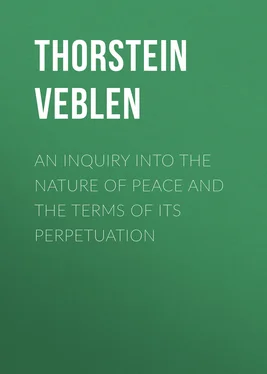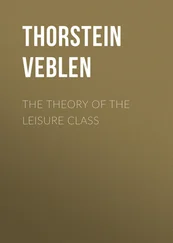Thorstein Veblen - An Inquiry into the Nature of Peace and the Terms of Its Perpetuation
Здесь есть возможность читать онлайн «Thorstein Veblen - An Inquiry into the Nature of Peace and the Terms of Its Perpetuation» — ознакомительный отрывок электронной книги совершенно бесплатно, а после прочтения отрывка купить полную версию. В некоторых случаях можно слушать аудио, скачать через торрент в формате fb2 и присутствует краткое содержание. Жанр: foreign_antique, Политика, Юриспруденция, foreign_edu, на английском языке. Описание произведения, (предисловие) а так же отзывы посетителей доступны на портале библиотеки ЛибКат.
- Название:An Inquiry into the Nature of Peace and the Terms of Its Perpetuation
- Автор:
- Жанр:
- Год:неизвестен
- ISBN:нет данных
- Рейтинг книги:5 / 5. Голосов: 1
-
Избранное:Добавить в избранное
- Отзывы:
-
Ваша оценка:
- 100
- 1
- 2
- 3
- 4
- 5
An Inquiry into the Nature of Peace and the Terms of Its Perpetuation: краткое содержание, описание и аннотация
Предлагаем к чтению аннотацию, описание, краткое содержание или предисловие (зависит от того, что написал сам автор книги «An Inquiry into the Nature of Peace and the Terms of Its Perpetuation»). Если вы не нашли необходимую информацию о книге — напишите в комментариях, мы постараемся отыскать её.
An Inquiry into the Nature of Peace and the Terms of Its Perpetuation — читать онлайн ознакомительный отрывок
Ниже представлен текст книги, разбитый по страницам. Система сохранения места последней прочитанной страницы, позволяет с удобством читать онлайн бесплатно книгу «An Inquiry into the Nature of Peace and the Terms of Its Perpetuation», без необходимости каждый раз заново искать на чём Вы остановились. Поставьте закладку, и сможете в любой момент перейти на страницу, на которой закончили чтение.
Интервал:
Закладка:
With continued advance in the industrial arts the circumstances conditioning life will undergo a progressive change of such a character that the joint interest of the group at large, in the material respect, will progressively be less closely bound up with the material fortunes of any particular member or members; until in the course of time and change there will, in effect, in ordinary times be no general and inclusive community of material interest binding the members together in a common fortune and working for a common livelihood. As the rights of ownership begin to take effect, so that the ownership of property and the pursuit of a livelihood under the rules of ownership come to govern men's economic relations, these material concerns will cease to be a matter of undivided joint interest, and will fall into the shape of interest in severalty. So soon and so far as this institution of ownership or property takes effect, men's material interests cease to run on lines of group solidarity. Solely, or almost solely, in the exceptional case of defense against a predatory incursion from outside, do the members of the group have a common interest of a material kind. Progressively as the state of the arts advances, the industrial organisation advances to a larger scale and a more extensive specialisation, with increasing divergence among individual interests and individual fortunes; and intercourse over larger distances grows easier and makes a larger grouping practicable; which enables a larger, prompter and more effective mobilisation of forces with which to defend or assert any joint claims. But by the same move it also follows, or at least it appears uniformly to have followed in the European case, that the accumulation of property and the rights of ownership have progressively come into the first place among the material interests of these peoples; while anything like a community of usufruct has imperceptibly fallen into the background, and has presently gone virtually into abeyance, except as an eventual recourse in extremis for the common defense. Property rights have displaced community of usufruct; and invidious distinctions as between persons, sub-groups, and classes have displaced community of prestige in the workday routine of these peoples; and the distinctions between contrasted persons or classes have come to rest, in an ever increasing degree, directly or indirectly, on invidious comparisons in respect of pecuniary standing rather than on personal affiliation with the group at large.
So, with the advance of the industrial arts a differentiation of a new character sets in and presently grows progressively more pronounced and more effectual, giving rise to a regrouping on lines that run regardless of those frontiers that divide one community from another for purposes of patriotic emulation. So far as it comes chiefly and typically in question here, this regrouping takes place on two distinct but somewhat related principles of contrast: that of wealth and poverty, and that of master and servant, or authority and obedience. The material interests of the population in this way come to be divided between the group of those who own and those who command, on the one hand, and of those who work and who obey, on the other hand.
Neither of these two contrasted categories of persons have any direct material interest in the maintenance of the patriotic community; or at any rate no such interest as should reasonably induce them to spend their own time and substance in support of the political (patriotic) organisation within which they live. It is only in so far as one or another of these interests looks for a more than proportionate share in any prospective gain from the joint enterprise, that the group or class in question can reasonably be counted on to bear its share in the joint venture. And it is only when and in so far as their particular material or self-regarding interest is reenforced by patriotic conceit, that they can be counted on to spend themselves in furtherance of the patriotic enterprise, without the assurance of a more than proportionate share in any gains that may be held in prospect from any such joint enterprise; and it is only in its patriotic bearing that the political community continues to be a joint venture. That is to say, in more generalised terms, through the development of the rights of property, and of such like prescriptive claims of privilege and prerogative, it has come about that other community interests have fallen away, until the collective prestige remains as virtually the sole community interest which can hold the sentiment of the group in a bond of solidarity.
To one or another of these several interested groups or classes within the community the political organisation may work a benefit; but only to one or another, not to each and several, jointly or collectively. Since by no chance will the benefit derived from such joint enterprise on the part of the community at large equal the joint cost; in as much as all joint enterprise of the kind that looks to material advantage works by one or another method of inhibition and takes effect, if at all, by lowering the aggregate efficiency of the several countries concerned, with a view to the differential gain of one at the cost of another. So, e.g., a protective tariff is plainly a conspiracy in restraint of trade, with a view to benefit the conspirators by hindering their competitors. The aggregate cost to the community at large of such an enterprise in retardation is always more than the gains it brings to those who may benefit by it.
In so speaking of the uses to which the common man's patriotic devotion may be turned, there is no intention to underrate its intrinsic value as a genial and generous trait of human nature. Doubtless it is best and chiefly to be appreciated as a spiritual quality that beautifies and ennobles its bearer, and that endows him with the full stature of manhood, quite irrespective of ulterior considerations. So it is to be conceded without argument that this patriotic animus is a highly meritorious frame of mind, and that it has an aesthetic value scarcely to be overstated in the farthest stretch of poetic license. But the question of its serviceability to the modern community, in any other than this decorative respect, and particularly its serviceability to the current needs of the common man in such a modern community, is not touched by such an admission; nor does this recognition of its generous spiritual nature afford any help toward answering a further question as to how and with what effect this animus may be turned to account by anyone who is in position to make use of the forces which it sets free.
Among Christian nations there still is, on the whole, a decided predilection for that ancient and authentic line of national repute that springs from warlike prowess. This repute for warlike prowess is what first comes to mind among civilised peoples when speaking of national greatness. And among those who have best preserved this warlike ideal of worth, the patriotic ambition is likely to converge on the prestige of their sovereign; so that it takes the concrete form of personal loyalty to a master, and so combines or coalesces with a servile habit of mind.
But peace hath its victories no less renowned than war, it is said; and peaceable folk of a patriotic temper have learned to make the best of their meager case and have found self-complacency in these victories of the peaceable order. So it may broadly be affirmed that all nations look with complacency on their own peculiar Culture—the organised complex of habits of thought and of conduct by which their own routine of life is regulated—as being in some way worthier than the corresponding habits of their neighbors. The case of the German Culture has latterly come under a strong light in this way. But while it may be that no other nation has been so naive as to make a concerted profession of faith to the effect that their own particular way of life is altogether commendable and is the only fashion of civilisation that is fit to survive; yet it will scarcely be an extravagance to assert that in their own secret mind these others, too, are blest with much the same consciousness of unique worth. Conscious virtue of this kind is a good and sufficient ground for patriotic inflation, so far as it goes. It commonly does not go beyond a defensive attitude, however. Now and again, as in the latterday German animation on this head, these phenomena of national use and wont may come to command such a degree of popular admiration as will incite to an aggressive or proselyting campaign.
Читать дальшеИнтервал:
Закладка:
Похожие книги на «An Inquiry into the Nature of Peace and the Terms of Its Perpetuation»
Представляем Вашему вниманию похожие книги на «An Inquiry into the Nature of Peace and the Terms of Its Perpetuation» списком для выбора. Мы отобрали схожую по названию и смыслу литературу в надежде предоставить читателям больше вариантов отыскать новые, интересные, ещё непрочитанные произведения.
Обсуждение, отзывы о книге «An Inquiry into the Nature of Peace and the Terms of Its Perpetuation» и просто собственные мнения читателей. Оставьте ваши комментарии, напишите, что Вы думаете о произведении, его смысле или главных героях. Укажите что конкретно понравилось, а что нет, и почему Вы так считаете.












